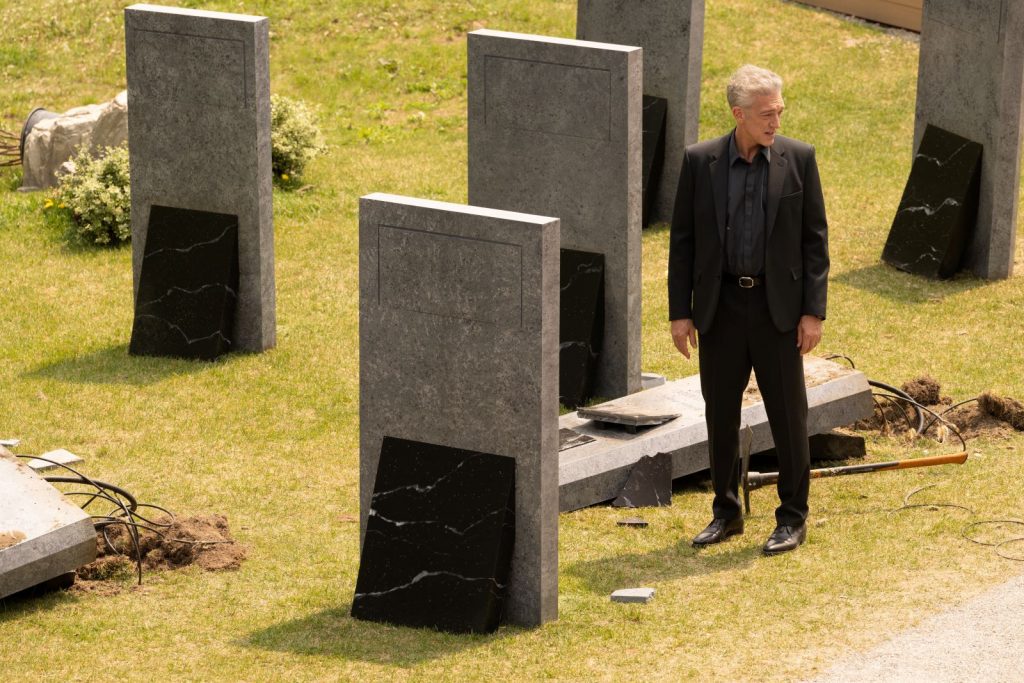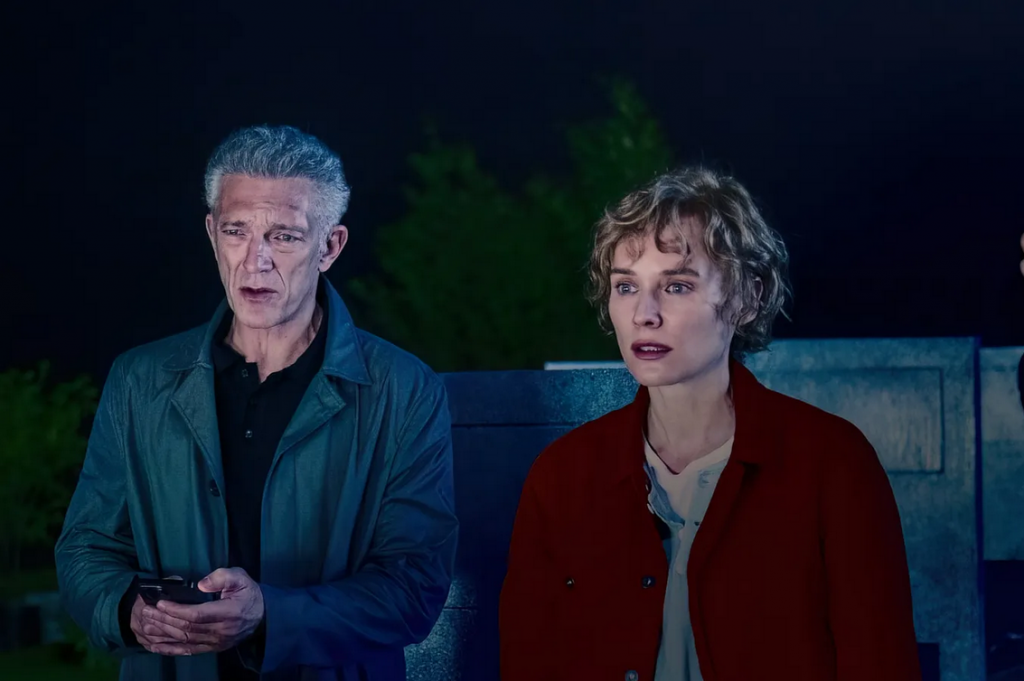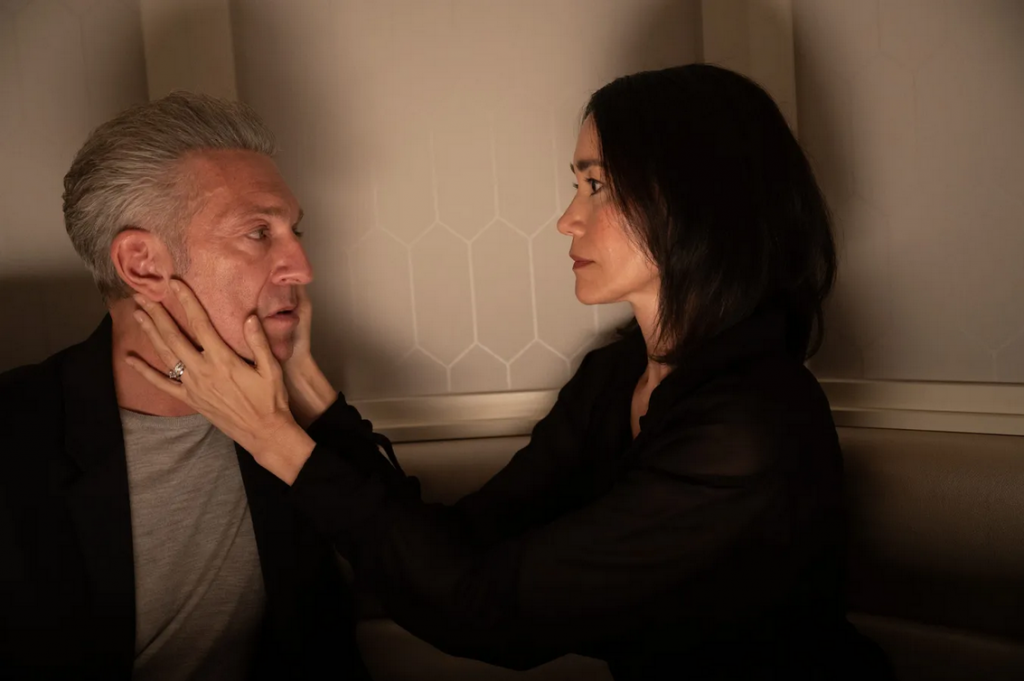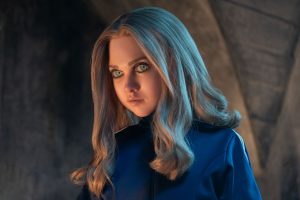Reviews include Superman, Apocalypse in the Tropics, and To a Land Unknown.
Kibbitzing with Cronenberg
May 25, 2024

By Jason Gorber
David Cronenberg returns to Cannes once again. His latest film, The Shrouds, is a stark yet moving portrait of grief, conspiracy, and the fascination with decay. The film follows a businessman (Vincent Cassel as avatar for the auteur) – part restaurateur, part pioneering inventor of high-tech cemetery accoutrement – who is navigating the loss of his wife in macabre and moving ways.
Along with Diane Kruger, Guy Pearce, Sandrine Holt and an ensemble of talents, the master of Body Horror (a label he often derides) crafts another of his creepy yet deeply involving stories, mixing aspects of philosophical depth and B-movie devices in his trademark fashion.
We spoke following The Shrouds’ premiere at this year’s Cannes Film Festival, where it screened as part of the official competition. While his 1996 masterwork Crash took a prize for “daring and audacity,” even in his late career, it’s clear that the filmmaker remains both daring and audacious as he continues along his remarkable path.
The following has been edited for clarity and concision
Jason Gorber: I don’t think it’s out of nowhere to say this feels the most autobiographical of your films.
David Cronenberg: That’s true.
For one, there’s an actor with your luscious hairstyle.
I didn’t cast him because of his hair. And I wasn’t really looking to create “me” on screen visually particularly, so, honestly, although it seems impossible, it’s a lucky accident. If you glimpse us in a mirror quickly, you might confuse us on the set, but mainly it was because of the hair, which he no longer has!
You are somebody who has encouraged us as audience members to read very carefully into your films. Many of us have failed miserably doing so. Do you get a certain joy out of people who completely miss the point of your films?
No, I don’t find that joyful at all. I get really pissed off. It often results in people saying rather stupid things. I don’t mind being criticized for something that’s there, but am very annoyed being criticized for something that isn’t there, or that they misread something completely. That’s obviously the relationship always between the artist and critic—it doesn’t matter what art form. It’s one thing to have an interesting interpretation that even I haven’t thought of, and that’s really quite exciting if that happens, but when it’s a complete misreading and misunderstanding, even if it’s positive in terms of a positive review, but it’s the wrong review. It’s a strange, interesting relationship.

The image that has stuck with me since seeing the film just before Cannes is that of the toppled tombstones, reminding what I saw in Prague [a monument to the desecration of Jewish cemeteries], or even the cemetery where my grandmother was born, north of Montreal, where desecration occurred. There’s a Jewishness to this film that I think is incredibly vital to express.
Interestingly, I wrote it before these times, before the increased intensity since the Hamas atrocity. I’m very Jewish, and I’m completely irreligious, and completely secular, and atheist. But nonetheless, I am Jewish in my sensibilities, and definitely formed by that. I wasn’t trying to make a statement particularly with the toppled tombstones, I must confess. I wasn’t particularly thinking of that resonance, even though it’s obvious, because I’m so focused on the universe within the movie. But as soon as the discussion of targeted tombstone desecration comes up, I mean, of course you think about it.
As a fellow secular Toronto Jew, I try to explain to people is that we are the people who first weaponized kvetching, but also helped birth the notion of literary criticism, of picking at the bones of ideas to keep them from resting in burial. We have a love of words, and then words about the words. For you, given everything that’s happening now, given the stories that are being told, given that people are positing things without having done any of the heavy lifting, the heavy work to even have something to say within the conversation, can you speak to how that makes you feel at this moment?
Sure. In my movie, conspiracy theories are a grief strategy. They give meaning to an event that’s meaningless. To some events, the only true response is to suffer. But the inner ability to actually accept that takes you sometimes to a place where you are going to create meaning through the means of a conspiracy theory. You tell yourself that your wife didn’t just die because she was sick, whether it was genetics or whatever. It must have been toxic waste. Or perhaps it’s a conspiracy of doctors who were experimenting on her and now she was about to reveal that, so they killed her. Suddenly that makes you very important, and you are heartened to know something that other people don’t know. It gives you a sense of momentum and a purpose in your life, to feel this, to know this. I think most conspiracy theories really have to do with that. And, of course, they are also often an expression of hatred.

When you lost your wife, did you go through these phases? Are you self-aware enough to avoid these pitfalls?
I think I was able to avoid the pitfalls. Once you’re within the mechanism of medicine, of hospitals, of hospitalization, of treatments, and the things that can happen–the confusions, the misinterpretations–it’s really a full time job dealing with that. You can sometimes think that somebody missed the boat, and as a result somebody has died because they misdiagnosed or two doctors did not communicate. You do get into that mentality. Once you’re in the hospital system, you really need somebody; you need help, a few people you can talk to about it. It takes a village to raise a kid? Well, it takes a village to get you through the hospital experience and come out the other side healthy. It’s tempting, and there are always people in the family who are very suspicious of the doctors: “this is not the doctor that should have been, this other doctor is much better,” or “the specialty is not his specialty” and “you should have gone to this other hospital.” I’ve been through that.
This is what I’m getting at: I think your films are able to be seen by people who have a little bit of information about you, to have been seen in its broad strokes, and I think many people, myself included, will occasionally miss some of the subtleties. What may we have missed about your own journey, about your own thoughts, your own beliefs, that you’ve buried in here?
Yeah, I don’t’ really need or want anybody to know anything about me. With this movie, there’s no moral value in the reality of it. That is to say, if the movie doesn’t work, then it’s no good. If it’s bad, it’s bad. The fact that it’s maybe based on some true stuff, and some of the lines of dialogue are actually taken from my life, means nothing. I’m assuming that there’s an audience that knows nothing about me and could care less about that and they’re just having the movie experience.
But for those of us who do care, is there an ingredient in there that may be more subtle than we…
…Well, that’s a different story. I’m not so sure. It depends on who you are.

Let’s talk about Vincent Cassel then. Let’s talk about what you elicited out of this performance and what you saw from, you obviously worked with him before, but there’s something particularly unique. Dare I say it, this is his most Jewish of performances.
Well, the word “schmuck” is used a lot in this movie, not by, and also by Vincent and also by Diane. That seemed very natural to me. It wasn’t like, “Oh, I’m going to do this.” It just flowed as I was writing it. It seemed very natural for some Yiddishisms. There’s a discussion right in the second scene of the movie, we learn she [his late wife] was Jewish, and he’s not, but he respects his wife’s religion. The movie begins with a discussion of the Jewish approach to the soul.
Back to potential breadcrumbs for us to follow: I hear the name Karsh, obviously I’m going to think of a celebrated Canadian photographer.
I wasn’t thinking of him, because that was his last name. His first name was Yousuf. I don’t know why I. I have no idea, the names really have to resonate.
I was reading all kinds of stuff about this name choice – Karsh was an iconic chronicler of our country, and you have somebody who’s photographing, or at least videoing, the decaying bodies of Canadians.
But I like that though! You have brought an additional layer of meaning to the movie, and that’s really fine. And it’s accurate enough, in essence. As a metaphor, that’s fine.
Equally, it’s hard to avoid thinking of the cinema of decay, which is fascinating. The whole notion of watching vicariously. When did that image first come to you?
It’s not vicarious—he has a perfect right—this is his wife, this is somebody he’s been with.
Ah, but he has access to all of the others as well.
He has asked for permission. He mentions it in the movie: He’ll give them a discount if they allow him to use their data. That’s no different from Apple saying, “Can I use your data?”

Voyeuristic maybe rather than vicarious? My point is, there’s something intensely cinematic about that notion, but there’s also something of a literary basis, like when you read books and pick apart the bones. I think this is such a redolent metaphor.
Sure, he talks about it in cinematic terms. This is a classic wide-angle view he says. And it didn’t get as big a laugh as it should have. It could be because of a language problem in the audience. There were a lot of jokes in the movie that the audience at our screening last night didn’t really didn’t pick up on, and I think it’s just because the Cannes audience is a very special audience, but I think there will be audiences that will get the humour there. So he’s being a film producer, and it’s mentioned that he was a producer of documentaries.
How much do you look over the things you have buried? How often do you rewatch the projects that you have put to the past?
I don’t. I don’t watch any of my old films at all. In fact, I find it painful.
Like watching a dead body in the ground would also be painful.
No, that would be less painful because it would be a change. Whereas when I watch my movies, they’re not changing. Sometimes I’m asked to look at them because there’s a new 8K or 4K version, and I find that difficult, I really just let it go. I don’t’ think of my movies when I’m making a movie, I really don’t. I know that other people will, and that’s fine.
Do you think of other movies when you’re making a movie?
No, I would find that very disturbing. I know that people in the past, De Palma, they would glory in saying this shot is to replicate that Hitchcock moment. That doesn’t do anything for me. Though I may love that Hitchcock moment, let’s say, I have no desire to replicate it in a different context, and it’s meaningless other than its reference. So no, each time I make a movie, and I’m sure I’ve said this before, it’s like it’s the first movie I’ve ever made.
We have a film here, The Substance, which I don’t know if you had a chance to see. You are aware, of course, of the success of Titane. I was saying this week I love that the French school system teaches young women to grow up and channel their inner Cronenberg. Two of your children are also doing this, of course. What does the legacy of being “Cronenbergian” mean to you?
Nothing. I love that these young women have found encouragement and excitement and enthusiasm through my filmmaking and that’s very delightful. And it’s like my children, you know. But l don’t think about legacy. That doesn’t give me anything. You have to be dead for there to be a real legacy, and once you’re dead, you don’t care.
We will continue to pick off your bones for years, and generations to come.
Well, that’s kind of cute to think about. It’s like the way the Parsis bury the dead: they don’t bury them, they put them on top of a pillar and let the vultures pick at their bones. That’s a perfectly reasonable burial.
It’s a perfect metaphor for what film critics do.
Yeah, exactly.



